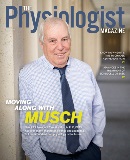Connecting the Dots of Life and Disease
By Jeremy W. Prokop, PhD
 I hear statements criticizing my scientific
perspective weekly: “You should focus your research for the sake of your career.” “Your science is all over the place.” “Your research lacks a hypothesis and therefore is not a valid approach.” Over the past decade,
while not easy, I have learned to look past these statements, resulting in the most fruitful discoveries of my career.
I hear statements criticizing my scientific
perspective weekly: “You should focus your research for the sake of your career.” “Your science is all over the place.” “Your research lacks a hypothesis and therefore is not a valid approach.” Over the past decade,
while not easy, I have learned to look past these statements, resulting in the most fruitful discoveries of my career.
Every individual has a different philosophy of learning and thinking. Some, such as I, are stimulated by ever-changing science and knowledge to find connections through the vast scientific overlap. While many think of us as those who get bored quickly or lack attention, I see this as the new normal of a fast-paced, data-heavy world in which research is a part.
I remember taking a jewelry-making class in high school and learning about what I always thought of as a hobby. Years later, I connected that knowledge with 3D printers to develop educational materials for understanding patients’ unique genetic variants, which has now brought smiles to thousands of people who have one of our science keychains.
In my PhD training in integrated biosciences, I remember meetings with professors and students in philosophy, biophysics, chemistry and engineering that all pushed my experiments to the next level. Since high school, I have worked with labs to bring scientific communication and collaboration to the forefront of what makes me a scientist, with my mentors encouraging my collaborative skills. I have learned that combining data and communication skills can connect the dots of life and disease applicable to so many fields of medicine.
In my current role at Corewell Health, one of the nation’s largest health care systems, I spend every day working with clinicians to pair their incredible ideas for improving patients’ lives with already-known data. Every day, I grow the tools to do this, learning new resources that may benefit my collaborators. I aim to integrate knowledge from often divergent fields to help clinicians find the edge of knowledge and propose subsequent logical experiments. Throughout the years, I have learned that connecting knowledge is more critical than any wet lab experiment one can plan. Yet, it has become evident that our current scientific environment requires expansion into observational science and training of those with the ability to apply these observational science approaches through collaboration.
I am glad as a scientist I did not listen to so many people who told me to focus
on my science and apply only hypothesis-centric research. Many of the scientists I looked up to often told me this. It was not easy to push forward. It was always tough to keep my eye on the bigger prize, the knowledge built by exploring whatever data
I could access. I worry for the next generation, who grow up around so much data, yet their mentors often make similar statements I heard throughout my training and early career.
I hope trainees reading this are encouraged never to give up
the quest for “connecting the dots of life and disease,” no matter what others tell you.
Jeremy W. Prokop, PhD, is the data science adviser within the Office of Research at Corewell Health and an assistant professor at Michigan State University College of Human Medicine. He leads research into genomics and data integration for human health, ranging from rare diseases to the physiological response of infectious agents.
This article was originally published in the November 2023 issue of The Physiologist Magazine.
“I am stimulated by ever-changing science and knowledge to find connections through the vast scientific overlap. While many think of us as those who get bored quickly or lack attention, I see this as the new normal of a fast-paced, data-heavy world in which research is a part.”
The Physiologist Magazine
Read the Latest Issue
Don’t miss out on the latest topics in science and research.
View the Issue Archive
Catch up on all the issues of The Physiologist Magazine.
Contact Us
For questions, comments or to share your story ideas, email us or call 301.634.7314.


